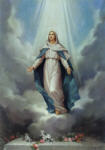
Marylike Standards
of Modesty in Dress
|
|
 |
Before repeating what was approved by Our Predecessors in regard to modesty in dress We shall copy a statement by St. John Chrysostom (4th Century). It is entitled Women�s Dress.
�You carry your snare everywhere and spread your nets in all places. You allege that you never invited others to sin. You did not, indeed by your words, but you have done so by your dress and your deportment and much more effectively than you could by your voice. When you have made another sin in his heart, how can you be innocent? Tell me, whom does this world condemn? Whom do judges in court punish? Those who drink poison, or those who prepare it and administer the fatal potion? You have prepared the abominable cup, you have given the death-dealing drink, and you are more criminal than those who poison the body; you murder not the body but the soul. And it is not to enemies you do this, nor are you urged on by any imaginary necessity, nor provoked to injury, but out of foolish vanity and pride.�We copy from The Marylike Standards of Modesty in Dress with an imprimatur dated September 24, 1956:
- �A dress cannot be called decent
which is cut deeper than two fingers breath under the pit of the throat;
which does not cover the arms at least to the elbows; and scarcely reaches
a bit beyond the knees. Furthermore, dresses of transparent materials
are improper.�
- Marylike is modest without compromise, �like Mary,� Christ�s Mother.
- Marylike dresses have sleeves extending at least to the elbows; and skirts reaching well below the knees. (Note: because of impossible market conditions quarter-length sleeves are temporarily tolerated with Ecclesiastical Approval, until Christian womanhood again turns to Mary as the model of modest in dress).
- Marylike dresses require full coverage for the bodice, chest, shoulders, and back; except for a cut-out about the neck not exceeding two fingers below the neckline in front and in back, and a corresponding two fingers on the shoulders.
- Marylike dresses do not admit as modest coverage transparent fabrics � laces, nets, organdy, nylons, etc. � unless sufficient backing is added. However, their moderate use as trimmings is acceptable.
- Marylike dresses avoid the improper use of flesh-colored fabrics.
- Marylike dresses conceal rather than reveal the figure of the wearer; they do not emphasize, unduly, parts of the body.
- Marylike dresses provide full coverage, even after jacket, cape or stole are removed.
There are three purposes for clothing:
- for modesty,
- to shield the body from the elements (heat and cold), and
- to adorn the body.
What about the type of material? Custom has it that denim blue is for working men�s clothing. Farmers, railroad workers, ditch diggers and the like use it with rightful practicality. It is not wedding garment material for men or women. When circumstances permit it, such types of material should not appear at divine services, for we must be on our best-dressed behavior when worshiping God. A person on the way to rough work and returning from it can be excused. Catholics should be leading the way in morality and elegance. We must elevate our rotten society and not live in it without influencing it for the better.

Pius, pp. XIII
Sept. 3, 1999

